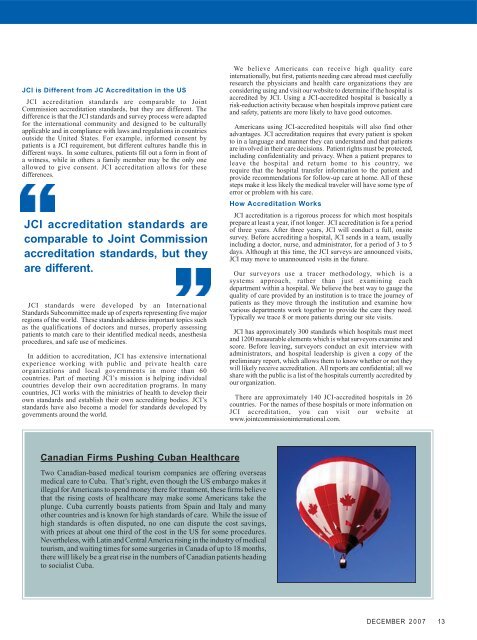Download PDF - Medical Tourism Magazine
Download PDF - Medical Tourism Magazine
Download PDF - Medical Tourism Magazine
You also want an ePaper? Increase the reach of your titles
YUMPU automatically turns print PDFs into web optimized ePapers that Google loves.
JCI is Different from JC Accreditation in the US<br />
JCI accreditation standards are comparable to Joint<br />
Commission accreditation standards, but they are different. The<br />
difference is that the JCI standards and survey process were adapted<br />
for the international community and designed to be culturally<br />
applicable and in compliance with laws and regulations in countries<br />
outside the United States. For example, informed consent by<br />
patients is a JCI requirement, but different cultures handle this in<br />
different ways. In some cultures, patients fill out a form in front of<br />
a witness, while in others a family member may be the only one<br />
allowed to give consent. JCI accreditation allows for these<br />
differences.<br />
JCI accreditation standards are<br />
comparable to Joint Commission<br />
accreditation standards, but they<br />
are different.<br />
JCI standards were developed by an International<br />
Standards Subcommittee made up of experts representing five major<br />
regions of the world. These standards address important topics such<br />
as the qualifications of doctors and nurses, properly assessing<br />
patients to match care to their identified medical needs, anesthesia<br />
procedures, and safe use of medicines.<br />
In addition to accreditation, JCI has extensive international<br />
experience working with public and private health care<br />
organizations and local governments in more than 60<br />
countries. Part of meeting JCI’s mission is helping individual<br />
countries develop their own accreditation programs. In many<br />
countries, JCI works with the ministries of health to develop their<br />
own standards and establish their own accrediting bodies. JCI’s<br />
standards have also become a model for standards developed by<br />
governments around the world.<br />
Canadian Firms Pushing Cuban Healthcare<br />
Two Canadian-based medical tourism companies are offering overseas<br />
medical care to Cuba. That’s right, even though the US embargo makes it<br />
illegal for Americans to spend money there for treatment, these firms believe<br />
that the rising costs of healthcare may make some Americans take the<br />
plunge. Cuba currently boasts patients from Spain and Italy and many<br />
other countries and is known for high standards of care. While the issue of<br />
high standards is often disputed, no one can dispute the cost savings,<br />
with prices at about one third of the cost in the US for some procedures.<br />
Nevertheless, with Latin and Central America rising in the industry of medical<br />
tourism, and waiting times for some surgeries in Canada of up to 18 months,<br />
there will likely be a great rise in the numbers of Canadian patients heading<br />
to socialist Cuba.<br />
We believe Americans can receive high quality care<br />
internationally, but first, patients needing care abroad must carefully<br />
research the physicians and health care organizations they are<br />
considering using and visit our website to determine if the hospital is<br />
accredited by JCI. Using a JCI-accredited hospital is basically a<br />
risk-reduction activity because when hospitals improve patient care<br />
and safety, patients are more likely to have good outcomes.<br />
Americans using JCI-accredited hospitals will also find other<br />
advantages. JCI accreditation requires that every patient is spoken<br />
to in a language and manner they can understand and that patients<br />
are involved in their care decisions. Patient rights must be protected,<br />
including confidentiality and privacy. When a patient prepares to<br />
leave the hospital and return home to his country, we<br />
require that the hospital transfer information to the patient and<br />
provide recommendations for follow-up care at home. All of these<br />
steps make it less likely the medical traveler will have some type of<br />
error or problem with his care.<br />
How Accreditation Works<br />
JCI accreditation is a rigorous process for which most hospitals<br />
prepare at least a year, if not longer. JCI accreditation is for a period<br />
of three years. After three years, JCI will conduct a full, onsite<br />
survey. Before accrediting a hospital, JCI sends in a team, usually<br />
including a doctor, nurse, and administrator, for a period of 3 to 5<br />
days. Although at this time, the JCI surveys are announced visits,<br />
JCI may move to unannounced visits in the future.<br />
Our surveyors use a tracer methodology, which is a<br />
systems approach, rather than just examining each<br />
department within a hospital. We believe the best way to gauge the<br />
quality of care provided by an institution is to trace the journey of<br />
patients as they move through the institution and examine how<br />
various departments work together to provide the care they need.<br />
Typically we trace 8 or more patients during our site visits.<br />
JCI has approximately 300 standards which hospitals must meet<br />
and 1200 measurable elements which is what surveyors examine and<br />
score. Before leaving, surveyors conduct an exit interview with<br />
administrators, and hospital leadership is given a copy of the<br />
preliminary report, which allows them to know whether or not they<br />
will likely receive accreditation. All reports are confidential; all we<br />
share with the public is a list of the hospitals currently accredited by<br />
our organization.<br />
There are approximately 140 JCI-accredited hospitals in 26<br />
countries. For the names of these hospitals or more information on<br />
JCI accreditation, you can visit our website at<br />
www.jointcommissioninternational.com.<br />
DECEMBER 2007 13


